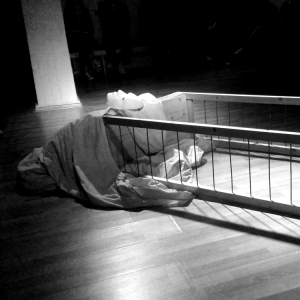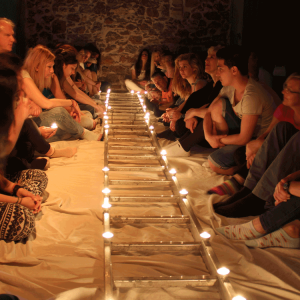The Method
Our theatrical- anthropological method aims at exploring the modes of expression as well as at developing expressive skills in order to train theatre animators and actors. Fundamental source of expression is the human body in all situations and kinesiological forms, silence and stillness, voice and speech. Emphasis is given to group dynamics for understanding otherness where body and voice improvisation through play, spontaneity, bodily expression and question is a basic technique for approaching a theatrical role and its behavior and motives. Texts create a context of situations where speech is developed and becomes a significant act.
Democritus University of Thrace
Drama teaching is characterized by its scientific and artistic essence which means that its structuring by the teacher requires knowledge about theatre both as theory and practice. It also requires the ability to animate a group in terms of art and pedagogy. Therefore, theatre education must be conducted by educators- animators who will be able to teach by animating a dramatic context as well as to play in role. Consequently, educating students and teachers requires their experiential involvement in theatre animation. Workshops in our theatre lab in Democritus University of Thrace assure the systematic theatre education of our students since they enable them to search for theoretical and practical issues of theatre. Students familiarize themselves with various innovative methods and develop the proper psychological, social and artistic / stage skills (reflective, expressive and communicative).
Pafsis Theatre Lab
Theatre Pedagogy defines its principles and purposes taking into account findings of psychology, pedagogy and social sciences. The psychological approach of Theatre Pedagogy gives us the opportunity to interpret and comprehend creation and animation in theatrical context from a psychoanalytical, phenomenological, humanitarian, socio-cognitive point of view.
In Pafsis theatre lab we develop our theatrical experience in the context of the group in an experiential way. This is understood through an interpersonal, social, reflective, lingual and kinesthetic dimension, elements which are an integral part of the intended dramatic development and theatrical apprenticeship of the participants. The empathic grasp of the “Other” constitutes a priority of Pafsis Theatrical Group in a way that otherness is placed in the core of theatrical research.
Curriculum Vitae
Dr. Simos Papadopoulos is Associate Professor of Theatre Pedagogy at the Department of Primary Education of the Democritus University of Thrace and drama animator as well. His work focuses on theatrical and pedagogical research and writing, with monographs and publishing in journals and collective volumes, scientific editing of academic books, announcements in Hellenic and International scientific conferences, and supervision for the creation of educational material for Theatre Pedagogy in Hellenic Primary Education.
He participates in research postgraduate programs and committees, within the frame of which he has undertaken the organisation of Hellenic and International conferences, as well as the publication of collective volumes. He has supervised doctoral theses and master’s dissertations concerning the multidisciplinary relation between Theatre Pedagogy and subjects from the field of Social Sciences and Humanities in the Democritus University of Thrace and other universities.
In this field, he serves the functional relation between Theory and Practice in the post graduate program of the Department of Primary Education in DUTH “Diversity and Theatre Pedagogy”, as well as with his noteworthy studies “Drama Language: Using Inquiry Drama on Language Teaching” (Kedros Publications, 2007), “Theatre Pedagogy” (2010) and “Drama in Education and the Ancient Hellenic Thought. The Mimesis of the Good Life” (Papazissis Publications, 2021). His research, educational and artistic action refers to Theatre Pedagogy and Drama Text Analysis in the Theatre for Young People in Brecht’s and Chekhov’s works.
He is the supervisor for the enhancement of the Curriculum and the creation of educational material for Theatre/Drama Education in primary education at the Institute of Educational Policy (IEP). Specifically, he oversees the development of the current Curriculum and the Teacher’s Guide, its pilot implementation, its transformation into a massive open online course (MOOC), and the professional development of Theatre/Drama Education teachers.
At your disposal for any information, use our contact form here:
Thank you for your interest on Simos Papadopoulos



